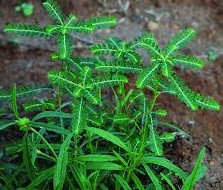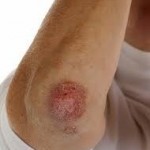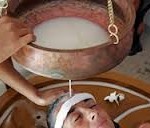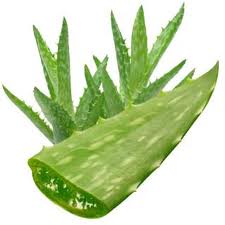A COMMON PLANT IN YOUR GARDEN THAT CURES JAUNDICE
April 8, 2013 by admin
Filed under Tips for Ayurveda
 When you take a stroll along your garden or backyard you get to see these short plants, fresh looking with yellow flowers and tiny berries underneath the leaves. You can observe these plant in wet areas and paddy fields. Therefore the name Keezhanelli meaning berries beneath the leaves. The English name is Stone breaker or Seed under leaf. The Botanical name is Phyllanthus Nururi.
When you take a stroll along your garden or backyard you get to see these short plants, fresh looking with yellow flowers and tiny berries underneath the leaves. You can observe these plant in wet areas and paddy fields. Therefore the name Keezhanelli meaning berries beneath the leaves. The English name is Stone breaker or Seed under leaf. The Botanical name is Phyllanthus Nururi.
Entire plant ( Root, stem, leaf ) is having medicinal value and the whole plant is used in Ayurvedic formulation. Traditionally it is given as paccha marunna to treat jaundice
Keezha Nelli cures disease like jaundice / hepatitis, Stomach pain, Urinary diseases, over heat, period problem, skin disease. Research on this herb proves that, it can cure cancer and reduce sugar content in our blood. It also takes care of the effective functioning of Liver.
Pacchamarunna is a poultice of Keezhanaelli stem and leaves, cumin seeds, tender castor leaves. It is grinded to a paste , mixed with fresh milk and 2 to 3 tspns are given twice a day. You need to take it very early in the morning before the sun’s heat is up and after sunset. The mixture is bitter and you will have difficulty in consumption. You can take ¼ tsp of sugar or misri (organic rock sugar).
Following are the symptoms to understand individual has jaundice:
- The white portion of eye turns yellowish, skin turn yellow and the urine is deep yellowish. (Sometimes when you take antibiotics also yellow urine is observed, do not be mistaken).
- the individual also complains of nausea , vomiting and stomach pains.
A simple test can be done at home in the following way – collect the early morning urine after you wake up from bed into a transparent glass or plastic mug. Put a handful of cooked rice into it and let it remain for an hour’s time. Drain the urine into closet and check the color of the rice. If rice has absorbed the urine and has turned to yellow then it is confirmed as Jaundice.
Conduct a blood test too and only then inform the status to the Vaidyar administering paccha marunna. The dosage and strength is determined based on the severity of the present health condition.
There are few conditions you need to strictly adhere to while taking the medicine:
- You should follow a strict diet (pathyam). Usage of tamarind, katta or sour items, ghee, oil, spicy food, pepper is not allowed. You can have fresh curd rice ans steamed vegetables.
- Smoking and consumption of alcohol is prohibited as it will have negative impact on the kidney.
- The individual should be committed to the conditions to avoid any variation. Keep snacks and edible items away from the individual having jaundice. This will minimize the temptation to savor food.
- The individual who has jaundice is asked to rest and not conduct any physical activities like running, jogging, working under hot conditions. You should not go out in the sultry time.
- A jaundice is contagious it is advised to keep the patient in a separate room. Separate clothing, plate, spoon, glass etc should be maintained such that it is not affect the other family members.
- You need to bath twice a day.Gradually the concentration gets flushed out with consistent medication and diet control.
- After a week’s medicine you need to do blood test and check the level of jaundice. You can be assured that jaundice will be cured with this paccha marunna.
- The patient should not take non-vegetarian food till 3 months for maximum benefits. This diet control will remove the problem completely and there will be no re-occurrence.
- You will gain good health and resume normal activities.
There are other medicinal benefits too.
Keezhanelli is effective in curing scabies and psoriasis: Apply a paste of Keezhanelli and turmeric powder on the affected areas on the skin. Let it remain for an hour’s time and then take a bath. You can see the difference after a few days of application.
AYURVEDIC TREATMENT FOR PSORIASIS
January 30, 2013 by admin
Filed under Tips for Ayurveda
 Psoriasis is a non infectious, inflammatory disease of the skin . Psoriasis is associated with dryness, itching, silvery scales on the skin and flakes on the scalp. Psoriasis can begin at an age of 20 or between 5 and 60 years too. It affects both the genders and the exact reason for Psoriasis is not known.
Psoriasis is a non infectious, inflammatory disease of the skin . Psoriasis is associated with dryness, itching, silvery scales on the skin and flakes on the scalp. Psoriasis can begin at an age of 20 or between 5 and 60 years too. It affects both the genders and the exact reason for Psoriasis is not known.
There is no treatment for psoriasis that can guarantee 100% result. Psoriasis is an auto immune disorder of the skin resulting in hyper proliferation of the skin especially at the elbows, knees, scalp. A natural psoriasis treatment that may help one person may have no effect on another person. Psoriasis treatment requires strict dietary restrictions and life style practices.
Ayurveda believes that impurities in the blood associated with emotional factors are the cause of the disease. Psoriasis known as Sidhma Kushtam is believed to occur due to vitiation of vata and kapha according to the ayurvedic concept. Irregular food habits, consumption of food items that cannot be eaten together for eg: diary products with fish, excessive intake of yogurt, black gram, seafood, jaggery ,sour and salted items etc can activate skin ailment. Alcohol and tobacco consumption will act as a catalyst here. Ayurveda emphasizes on the effect of stress which worsens the person affected by psoriasis.
Panchakarma treatment for psoriasis
 Panchakarma, the basic body purification method is used in the treatment of psoriasis. Ayurvedic treatment for psoriasis goes through several stages .
Panchakarma, the basic body purification method is used in the treatment of psoriasis. Ayurvedic treatment for psoriasis goes through several stages .
- Lepanam (application of ointments),
- Abhayangam (oil massage),
- snehapanam (taking medicated ghee),
- pizhichil (full body massage),
- avisnanam (medicated steam bath),
- sirovasti (keeping oil on head) and
- bastis (medicated enema).
Both systemic and topical treatments are used and can include drinking medicated ghee, purging and vomiting to detoxify.
- Detoxifying, by inducing vomiting (Vamana) and purgation (Virechana).
- Using medicated buttermilk dripping overhead (Dahara)
- Followed by pasting the entire body topically with a paste of medicines and mud,
- Finally medicated enemas (Basthi’s) are given for a week.
Internal medications in the form of herbal concoctions and medicated ghee has to be consumed for atleast three months.
Herbs used in Ayurvedic treatment for psoriasis
- Turmeric has anti-inflammatory and anti-bacterial properties and will help relive pain, reduce inflammation. Due to the antibacterial and anti-inflammatory properties of turmeric, it relieves the pain, swelling and inflammation associated with psoriasis, arthritis etc.
- Garlic (Allium sativum) – helps purify the blood and get rid of toxins
- Neem – purifies and detoxifies, helps the immune system and has antis, anti-bacterial and anti-fungal properties. It enhances immune system and neem oil is an antiseptic in itself. Will help with the redness and itching of psoriasis.
- Guggul a resin from a tree that grows in India it is anti-inflammatory and helps remove excess fats and fluids from the body. Kaishore guggul is useful remedy for psoriasis.
- Black Nightshade (Solanum nigrum)- Kakmachi – The juice of the leaves of the black nightshade can be applied locally on the affected regions. It helps in reducing the inflammation of the skin, and also has beneficial properties in minimizing discomfort and itching.
- Aloe vera: The gel extracted from the medicinal herb may be affected directly on the affected parts. The anti burn property is helpful to minimize itch and gives a cooling effect on the skin. Moisturizes skin and extremely helpful for plaque psoriasis.
- Jasmine (Jasminum polyanthum)–The flowers of the jasmine reduces pain, inflammation and soothes itching.
ALOE VERA AND ITS USES
September 20, 2012 by admin
Filed under Tips for Ayurveda
 Aloe vera is a species of succulent plant that probably originated in northern Africa. The species does not have any naturally occurring populations, although closely related aloes do occur in northern Africa.
Aloe vera is a species of succulent plant that probably originated in northern Africa. The species does not have any naturally occurring populations, although closely related aloes do occur in northern Africa.
Aloe Vera is a medicinal plant which belongs to the family of Cactus. There are several varieties of this plant but only one particular variety is used for medicinal purposes. The medicinal reputation of Aloe Vera dates back to many thousand years.
The Latin word Vera meaning ”True” was added to this particular species of Aloe plant to distinguish it from the rest of the aloe plants. Only this particular species has the therapeutic properties. The medicinal properties of the Aloe Vera plant have been re-discovered recently. But it is one of the age old natural remedies used by our ancestors. . It has vitamins, sugars, minerals, anthraquinones and many more. It has an enzyme called carboxy-peptidase that has anti-inflammatory effects. It also has various amino acids, Vitamins A, C and F .Aloe Vera is a truly magical herb.
The Use of Aloe Vera is found in Ayurveda in various text books, post Samhita period. It is a perfect plant for your home. A common sight in India, aloe vera plant is placed in pots or hung in pots at the entrance of houses.
Health Benefits of Aloe Vera
- Any kind of wound is healed either by topical dressing or by oral intake. Aloe Vera heals scalds, burns and speeds up the healing and recovery period as well. It is a natural coolant.
- Aloe Vera is a powerful detoxifier, antiseptic and tonic for the nervous system.
- Aloe Vera also has immune-boosting and anti-viral properties.
- Aloe Vera improves digestion. As a general health tonic, there are benefits in taking a measure of Aloe Vera each day.
- Aloe Vera is used as a tonic to treat amenorrhea, jaundice and piles.
- The acid found inside Aloe Vera is used as an effective pain killer.
- Aloe Vera is beneficial for the skin, prevents acne, and enhances skin growth.
- Aloe Vera is used to treat dermatitis, disorders of the skin and X-ray burns.
- Aloe Vera has a great ability to heal burns, ulcers and wounds.
- Aloe Vera is also used as an antiseptic that kills bacteria, fungi, molds and viruses.
- Aloe Vera can be used for insect bites, sores, urticaria, blisters, herpes, athlete’s foot, vaginal infections, allergic reactions, conjunctivitis, dry skin and fungal infections.
- Other benefits are the topical application of this herb helps in curing frostbite, psoriasis, rosacea, wrinkles, aging, warts and eczema.
- Oral intake of Aloe Vera is effective in treating and soothing heartburn, rheumatic pain, asthma and arthritis.
- Aloe Vera has positive effect in lowering the blood sugar levels in Diabetes Mellitus.
- Aloe Vera supports as a laxative. Prevents constipation.
- Aloe vera is a good anti-aging herb. It is extensively used in preparation of cosmetics products. Aloe vera is also known to help slow down the appearance of wrinkles. It is an excellent moisturizer.
- Aloe Vera is a plant with a rare ability to calm all the three Doshas.
- Aloe Vera is believed to reduce severe joint and muscle pain associated with arthritis, as well as pain related to injuries. Direct application on the affected area is recommended.
- Aloe Vera heals skin problems like psoriasis.
- Enzymes present in aloe vera helps in strengthening hair. Aloe vera is also found useful for treating androgenic alopeda.
- Too long use of this herb can result in hematuria, loss of potassium, albuminaria and imbalance of fluids in the human body.
- The oral intake can result in diarrhea and abdominal cramps.
- Aloe vera is found to cause rashes in some skin, when used externally. So please use this plant products only after consulting your physician.
- It should not be used during menstruation, Pregnancy, breast feeding and intestinal disorders.
Few watch outs during usage of Aloe vera:
- Too long use of this herb can result in hematuria, loss of potassium, albuminaria and imbalance of fluids in the human body.
- The oral intake can result in diarrhea and abdominal cramps.
- Aloe vera is found to cause rashes in some skin, when used externally. So please use this plant products only after consulting your physician.
- It should not be used during menstruation, Pregnancy, breast feeding and intestinal disorders.







